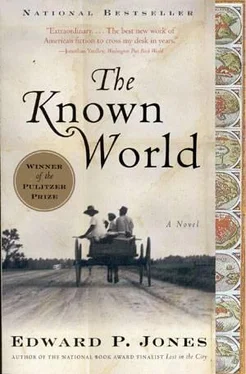Moses, still behind Counsel and his horse, said to the white men and to Louis, “Please, yall, don’t hurt me like that. Please.” He called out to Elias, “Please, don’t let em hurt me. Please, tell em to let me be, Elias.”
Elias could see Celeste standing in their cabin doorway, waiting for him. He needed Celeste now. He needed Celeste to tell him right and point him toward home. How had he come to forget just where he was in the world? He worried at that moment that something would happen to him on that road with the white men raging and that he would never see his family again. After Moses, Elias knew he would be next, and then Louis, the son of a black woman. And if they needed more, the white men would jump on the Indian, who wasn’t as white as he always thought he was.
Counsel and Travis and Oden got off their horses. Moses turned to run but Counsel took the rope he had tied Moses with and pulled him back. Barnum, on his horse, said, “He ain’t the one that hurt John. He ain’t the one. And besides, it look like he done learned his lesson.” Oden looked at Travis and the two men laughed.
With Counsel and Travis holding the still-tied Moses, Oden bent down and put his knife, in two swift back and forth motions, through Moses’s Achilles’ tendon. “Please,” Moses kept saying, “let me be.” He tried to get Elias’s attention, and he tried to get Louis’s attention. “Please let me be.” Moments after the cutting, Oden applied his blood-stopping poultice to Moses’s wound and the slave collapsed, screaming in agony.
Barnum rode away, rode toward his home and his family. There was not anything in Virginia for him anymore. He had been treading water all his life in Virginia-not enough water to drown him, but just enough to always keep his feet and britches wet. He was many miles away before he heard Moses stop screaming.
Hobbling anyone left a mark in the dirt for someone to always take note of, and that would be the case with Moses. A person knowing anything about the science of hobbling wouldn’t take note of the mark in the road for very long. But a person ignorant of the science of hobbling might well bend down and wonder for the longest why a barefoot man would walk full on one foot and then tiptoe along forever on the other foot.
Back in Mildred’s house two hours earlier, Moses said some words over her body but he knew what he was saying was not enough. He had never really listened all the way to a funeral speech and so was at a loss to say the proper thing. Had I only listened, he berated himself as he cleared the kitchen table of everything. He put the bowl of apples on a chair and took off the tablecloth. He knew he was grateful to her and so as he worked he thanked Mildred for helping him and then he picked up her body and laid her out on the table. He closed Mildred’s eyes. A slower death would have given her all the time she needed to lie down and close her own eyes. Moses covered her body with the tablecloth and began thinking of more words to say. “You know, Moses,” she had said only the day before, “I love a good tablecloth. I would rather have a good tablecloth over a good quilt any day. The bed could go naked for all I care, but I got to have my tablecloth for my meals.”
Not long after John Skiffington’s murder, Barnum Kinsey took his family to Missouri, where his wife had people. Barnum died not long after they crossed the Mississippi River, in a town called Hollinger. His oldest child from his second marriage, Matthew, stayed up all the night before he was buried, putting his father’s history on a wooden tombstone. He began with his father’s name on the first line, and on the next, he put the years of his father’s coming and going. Then all the things he knew his father had been. Husband. Father. Farmer. Grandfather. Patroller. Tobacco Man. Tree Maker. The letters of the words got smaller and smaller as the boy, not quite twelve, neared the bottom of the wood because he had never made a headstone for anyone before so he had not compensated for all that he would have to put on it. The boy filled up the whole piece of wood and at the end of the last line he put a period. His father’s grave would remain, but the wooden marker would not last out the year. The boy knew better than to put a period at the end of such a sentence. Something that was not even a true and proper sentence, with subject aplenty, but no verb to pull it all together. A sentence, Matthew’s teacher back in Virginia had tried to drum into his thick Kinsey head, could live without a subject, but it could not live without a verb.
At Mildred’s house the day she died, Counsel stepped out onto her porch and looked but once at his cousin’s body and took out his tobacco and paper and rolled a cigarette. He had no more chewing tobacco. John Skiffington’s foot finally came out of the stirrup and Counsel watched as John’s horse began to walk away. Counsel wondered if the beast knew the way home, or would some bear ultimately come upon him drinking at a stream and take him down. He heard just a little movement from Moses inside the house. He should have picked up the dead woman’s gun after all. The nigger could take it and hit him upside the head. Knowing this was possible, Counsel turned fully toward the doorway so he could be ready. All the gold would mean that he could buy a giant tombstone for John’s grave, one as large as the man himself had been. He envisioned a tombstone so big that wild and insane men would come down from their lairs in the Virginia mountains and worship at the tombstone, thinking it stood over the grave of someone who had been a god.
On the road some two hours later, after Oden had hobbled Moses, he got back up on his horse. He looked down at the man writhing on the ground and at his own handiwork. Moses certainly could not walk back home now and Oden extended his arm down. He had gone out without a saddle that day. Oden said, “He won’t bleed for long. Heft him on up here.” Everyone, except Elias, helped Moses up onto the back of Oden’s horse. Louis trembled to see Moses in pain. By rights, Oden could have made Elias the slave carry Moses, but he didn’t like the evil that seemed to be building in Elias. He might have been able to make Louis carry him if he hadn’t been William Robbins’s son. So it was just as well that he chose to carry Moses and not make a fuss about it. “Heft him up. I’ll take him in. He ain’t gon bleed for long,” Oden said, though no one could hear him above Moses’s cries. Oden would never put his knife to a man again. It was one thing to cut a man, collect money for a job well done and go home and sup with his family. It was another to ride a long way with the man at his back, agonizing all the way in Oden’s ear, the man’s arms around Oden’s waist because the man had a fear, even in his great pain, of falling off the horse.
After Moses covered Mildred’s body with the tablecloth, he stepped onto her porch and got his first good look at the body of John Skiffington in the yard. He had no words for the dead man because he could not think of one good thing Skiffington had ever done for him. There would be plenty of people to mourn him, Moses thought, maybe even just as many as would mourn Mildred. Counsel looked at Moses, stepped onto the ground and put out his cigarette in the dirt. There was no use chancing a fire before he could get out all the gold.
Counsel Skiffington did not find any more gold at Mildred’s place. The five twenty-dollar pieces were all there was. For weeks, he went out to her place alone and dug all about her land, then, as he felt time was running out, he got the help of Oden and Travis. A split treasure was better than none, and he could get away with giving the Indian less than he would have to share with the white man. They found hidden compartments in the house that they did not know were designed to hide slaves for the Underground Railroad. In their frustration, they burned the house down, but Counsel kept many things, including the walking sticks. But the law eventually made him give everything he had taken to Caldonia Townsend. For years and years, Counsel fought for the land in the legal arena. He used a theory cooked up by Arthur Brindle, the dry goods merchant who had once been a lawyer, and claimed that there was some basis for him to have the property because his cousin had been murdered there. He enlisted the help of Robert Colfax, but the law went to Caldonia’s side. He married the boardinghouse woman. They had no children.
Читать дальше












